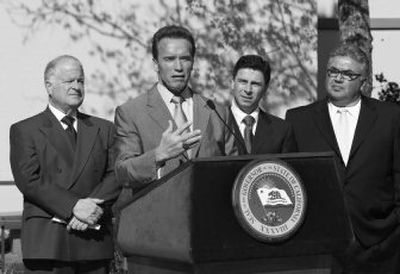California joins rush to earlier primaries

WASHINGTON – In the not-so-distant past, general-election campaigns for president started on Labor Day, kicking off a nine-week contest between the Democratic and Republican nominees.
Now, thanks in part to action taken Thursday, party nominations may be settled effectively by next Valentine’s Day, sending the two major-party nominees off on a nine-month slugfest for the White House.
California on Thursday moved its presidential primary up to next Feb. 5, joining a torrent of states that are rushing to accelerate voting in primaries and caucuses for party nominees.
After a brief campaign in January in which candidates will interact with voters face-to-face in four small states – Iowa, Nevada, New Hampshire and South Carolina – next year’s presidential campaign is likely to explode into a de facto national primary the first week in February, with as many as 23 states voting Feb. 5.
Some state legislatures still are weighing what to do, but if all those that are considering Feb. 5 end up choosing it, those states would comprise 192 million Americans – 2 out of every 3 – more than enough to effectively settle the nominations.
“Is this any way to pick a president? The answer is no. This is ridiculous,” said Bill Galvin, the secretary of state in Massachusetts and co-chairman of the National Association of Secretaries of State’s Subcommittee on Presidential Primaries.
He said the voting would come too early and too fast for people to pay meaningful attention.
“Most Americans won’t have a say in choosing the presidential nominee, and those that do will have a few weeks at most to make up their minds,” Galvin said.
The trend could indeed amplify the voices of the four early-voting states, which draw so much media attention to the winners that it could set them up for a nationwide sweep Feb. 5.
But whether candidates sweep or split the Feb. 5 Mega-Tuesday voting, loading so many state contests on that single early day will change the way that parties pick their nominees and the country picks its presidents.
A Feb. 5 coast-to-coast mega-primary puts a premium on candidates with well-known names, deep campaign treasuries and extensive organizations. That’s yet another edge for front-running candidates Sens. Hillary Rodham Clinton of New York and Barack Obama of Illinois, both Democrats, and former New York Mayor Rudy Giuliani and Sen. John McCain of Arizona, both Republicans.
To campaign in simultaneous primaries in California, Texas, Illinois, Florida and New Jersey, for example, a candidate will be forced to rely on expensive TV advertising and an extensive volunteer organization.
Candidates from small states with limited campaign budgets will have an even harder time breaking through than in the past. The new schedule could build an insurmountable wall for today’s second-tier candidates, such as Gov. Bill Richardson of New Mexico, a Democrat, or Sen. Sam Brownback of Kansas, a Republican.